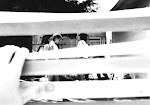One of my recent reads is Mal Peet's Life: An Exploded Diagram. Like his earlier Tamar, it's a multi-layered book, a story with tentacles that reach back to WWI and forward to 9/11. The heart of the book -- and really the best part, as I thought a lot of the layering was unnecessary -- is the relationship between two small-town teens, deeply in love and lust, during the Cuban Missile Crisis.
This, and the current setting on my WIP, brought me to thinking how to convey the atmosphere of the Cold War to teens reading today. The oddest part of it, for me, is the way we dealt the prospect of total nuclear war: we just tried not to think about it. I was well aware that in Europe there were massive protests against missile silos and sit-ins at Army bases, but for me it was just a reality that couldn't be looked at. It had always been there, and it was insane, and it just didn't bear thinking about.
The thing about things that you don't want to think about, however, is that you do think about them, sometimes when you least expect it. One summer when I was in college my mother and sister came up to New York and we took a long car trip up into Canada, through the Maritime Provinces, culminating in a stop in Prince Edward Island. It was a beautiful place, still remote (we had to take the ferry over), green hills, red roads, stormy clouds coming in off the sea and the sun shining through them. We stayed in Cavendish and went to the Green Gables house, walked Lovers Lane and the Haunted Wood. That evening we decided to drive out to "lobster supper", a traditional event held in a basement of a local church. Now, I don't eat lobster and my mother can't eat it, so why we decided this would be a desirable thing to do, and what we did end up eating, have been lost in the mists of time*, but what I do remember is driving back along a lonely, winding PEI road. The moon had come up, and it was orange. I had seen orange or red moons before and I vaguely knew that it was just some atmospheric-type phenomenon involving dust or something, but in the darkness, in that strange place, I began to wonder if maybe it wasn't something worse. What if, while we were on vacation, the nuclear button had been pushed? What if the moon was orange because it was reflecting distant fires burning in the lower parts of North America? (It was easy to believe that the Russians might not bother to bomb PEI.) We'd be trapped up here, forever, everything familiar gone, homeless, stateless, alone. The world gone, the future gone. I mused on and on and worked myself up in to a state of cold terror that not even our arrival back at our rooms in Cavendish could dispel. I don't remember anything else,but I suppose in the light of the next morning everything was normal again, and so we packed up and went on to Nova Scotia.
The strongest feeling from this memory is the feeling that there was no hope. We were slowly, inexorably moving towards the day when everything would end. If it wasn't today, it would nevertheless come. (We always believed it would be very sudden too -- without warning, although the experience of the Cuban Missile Crisis should have proved otherwise.) For me, the end of the Cold War has been a modern miracle. It's something I always try to keep in mind no matter who the enemy is made out to be, and no matter what we are supposed to believe about them.
*The mists of time have no power against my old diaries, which reveal that the church was called St. Ann's and I had potato salad while Mom had filet of sole, and that my opinion of the cuisine was uncomplimentary. Of my nighttime terror I simply wrote, "lonely drive home in the dark."
Monday, February 13, 2012
Subscribe to:
Post Comments (Atom)








1 comment:
Great descriptions. I felt like I was there with you staring at that eerie moon. The writer's mind is alive with "What ifs." It's good, most of the time. Love it that your diary had the facts.
Post a Comment